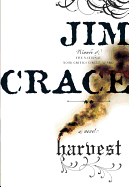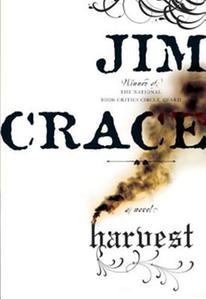
 It's one thing to imagine a world outside our own time and place--movies, video games, even comic books do it quite well. It is much more difficult to create such a world effectively with nothing but words on paper. Jim Crace has successfully pulled this off in almost a dozen diverse novels infused with rich language and character particular to whatever story he is telling, whether it takes place in a Bronze Age village or on an imaginary new continent. In Harvest, Crace is working at the top of his craft as he shows us a traditional English tenant farm unraveling under the changes of a new landlord and the economic challenges of a cash economy.
It's one thing to imagine a world outside our own time and place--movies, video games, even comic books do it quite well. It is much more difficult to create such a world effectively with nothing but words on paper. Jim Crace has successfully pulled this off in almost a dozen diverse novels infused with rich language and character particular to whatever story he is telling, whether it takes place in a Bronze Age village or on an imaginary new continent. In Harvest, Crace is working at the top of his craft as he shows us a traditional English tenant farm unraveling under the changes of a new landlord and the economic challenges of a cash economy.
Harvest is narrated by Walter Thirsk, a city man who came to the remote village 12 years before as a servant to the Master Kent, but chose to join the villagers in the barley fields rather than stay in the relative comfort of the manor. Master Kent is a widower, and so, under English law, the rights to the estate will now pass to his wife's brother from the city. Like Conrad's Marlowe in Heart of Darkness, Thirsk is an observant narrator who is both a part of the village yet also, always, an outsider. He struggles with the loss of his wife and the impending loss of the farm's paternalistic master. He appreciates the natural rhythm and labor of farm work among the "awns and whiskers of the barley's ears... brittle and dry enough to chit-chatchit... nattering with ten thousand voices at every effort of the wind or every scarper of a rabbit, mouse, or bird."
When a surveyor arrives on behalf of the new master to map the range of the estate and draw up a proposal to "fence and quickthorn all the land and turn everything... into gallant sheep country," Thirsk sees no way to avoid the impending changes. Itinerant drifters set up camp in the "wasted woods" the same day that a fire destroys the master's barn, and the tenants' fears turn them violent. They are decent people, but as Thirsk observes, "We do not press too closely to [God's] bosom.... He touches us, but only just." As the new master arrogantly rides into the village, Kent's favorite horse is killed by a nail hammered into his head and all hell breaks loose in the English countryside.
With Thirsk as our witness, we watch a way of life dismantle before our eyes. Crace's imaginary world is as powerfully engrossing as anything the real world throws our way. --Bruce Jacobs
Shelf Talker: An isolated English tenant farm collapses in the face of economic and social upheavals in Crace's vividly created world.

